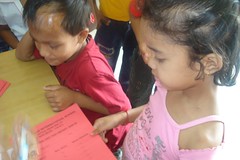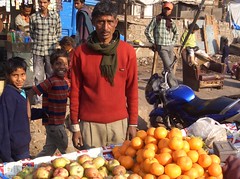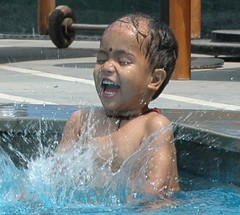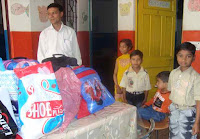
by Anuradha Bakshi | May 7, 2009 | Uncategorized
 Yesterday Kiran came to me with three pages of written text: it was her holiday home work. I was taken aback. The homework covered every subject and seemed humongous: read two books and find 3o new words, write five sentences about your daily activities and if you want to get an A in handwriting write a page of cursive writing a day. That was English. There was more of the same for each and every subject: maths, moral science, science and Hindi. And that is not all she also had to make a terrarium, draw a globe on a ball, make an abacus and a bird feeder, take a ride in a mtero and write about it and paste pictures of the places ahe visited during her holidays. Wow! And the holidays are for 6 short weeks. And by the way Kiran is just in class III.
Yesterday Kiran came to me with three pages of written text: it was her holiday home work. I was taken aback. The homework covered every subject and seemed humongous: read two books and find 3o new words, write five sentences about your daily activities and if you want to get an A in handwriting write a page of cursive writing a day. That was English. There was more of the same for each and every subject: maths, moral science, science and Hindi. And that is not all she also had to make a terrarium, draw a globe on a ball, make an abacus and a bird feeder, take a ride in a mtero and write about it and paste pictures of the places ahe visited during her holidays. Wow! And the holidays are for 6 short weeks. And by the way Kiran is just in class III.
Now the purpose of this post is not to debate about the wisdom of holiday home work. What one is trying to highlight is something quite different. As some of you know Kiran belongs to what we would call a slum and her family took a very conscious and deliberated decision: that of putting Kiran in an English medium school and give her the best possible. Her admission was not an easy affair and her school years have seen many hurdles. Now Kiran has a support system – aka project why- which helps her overcome such hurdles. But what about other children whose family have after great sacrifice get them admission in English medium schools and bravely try to cross to the other side of the invisible fence? How would such families be able to help their children with holiday homework. Even I do not quite know how to make a terrarium!
Lats week we had a visitor who told us about an organisation that was engaged in getting slum children admitted to good public schools. He thought we would appreciate the effort and maybe want to learn to replicate it. He must have been very surprised at our lukewarm reaction. My decision to send Utpal and my foster care kids to boarding school has also raised many eyebrows. Why not just send them to a local public school. The answer is simple: a boarding school gives an inbuilt support system that no slum family can give and without which no child can succeed. I remember an acquaintance telling me how her driver’s son was ostracized in the public school she had got him admitted to. Even if he had good marks he never got invited to a birthday party. A tale of two Indias!
But in a lighter vein how do you expect a mom who has been to a government school and probably dropped out to help her child with her holiday homework. And yet no class III kid could on her own figure out the homework as stated in those three pages. Even though children from the other side have been accepted in upmarket schools, be it because parents pay the fees or because of some illogical government rule, schools are not slum child friendly… maybe it was time we addressed this issue.

by Anuradha Bakshi | May 5, 2009 | Uncategorized
 I watched Radha solve her first puzzle and Conrad Veidt’s quote came to mind: So now it is time to disassemble the parts of the jigsaw puzzle or to piece another one together, for I find that, having come to the end of my story, my life is just beginning. But there is a catch: Radha’s life is slowly and irrevocably ending.
I watched Radha solve her first puzzle and Conrad Veidt’s quote came to mind: So now it is time to disassemble the parts of the jigsaw puzzle or to piece another one together, for I find that, having come to the end of my story, my life is just beginning. But there is a catch: Radha’s life is slowly and irrevocably ending.
Her life has been a series of unsolved or poorly solved puzzles. When she came to us she had a family, or rather we should say a father. Then one dark evening he passed away. We were certain that we could save the family and have them all come and live at the women centre – was that not what the centre was for – but that to was not to be. Predators and supposed well wishers emerged from the woodwork and put an end to that. The mother was convinced no to come to us, or maybe she herself wanted to remain free of the constraints of a residential programme. One will never know. The end result was that Radha, whose dream is to be able to walk one day, continues to live in what I call a kennel, but what to her is home. And in that home she continues to break her little brittle bones with regularity.
In the best of cases the life expectancy of children with OI is short. There is no known cure to the disease just some therapies that can help reduce pain and complications. Most of these are out of the reach of a slum child.
Radha’s desire to learn is mind blowing. She just wants to catch life with both hands and get whatever she can out of it. She had never been to school before she came to us. Since she has been at pwhy she has learnt many things. She now has a little table which ensures that her legs are safe from hurt. When other children dance or indulge in some physical activity, Radha devours books. Though she cannot read well yet, she flicks through the pages, an intent look on her face and a burning desire in her eyes. She wants to learn with quantum leaps and we try and follow…
When I watch Radha I am filled with sadness and a sense of helplessness. There is so much I would want to do and cannot. Were planet why up and running we would have kept her with us and taken care of her. But planet why is still a dream and little Radha’s life an enigma. One can just hope and pray for miracles. And while we wait and pray, little Radha is busy solving new puzzles.

by Anuradha Bakshi | May 1, 2009 | Uncategorized
 There is a vegetable vendor in our colony. You can find him at the street corner from the wee hours of the morning to late at night be it the hottest day of the year or the coldest night. Several times during the day he walks the streets of the colony and you can hear his cry as he passes in front of your home hoping against hope that someone will call for him. After each round he goes back to his assigned place at the street corner.
There is a vegetable vendor in our colony. You can find him at the street corner from the wee hours of the morning to late at night be it the hottest day of the year or the coldest night. Several times during the day he walks the streets of the colony and you can hear his cry as he passes in front of your home hoping against hope that someone will call for him. After each round he goes back to his assigned place at the street corner.
No matter how hot or cold it is, no matter if it is raining or scorching our vegetable vendor does not miss his rounds. His cry is like the comfortable chime of an old clock. When you hear him you somehow know that all is well. Yet each time I hear his cry I feel oddly disturbed. Many of us do not know that to be present on time at his street corner, the vendor has to leave his home in some slum or the other in the dead of night and reach the whole sale market to purchase his ware. He then has to carefully display all the vegetables on his cart and make his way to the place where we find him everyday.
Many of the parents of pwhy children are such vegetable vendors. Most of them left their home because of a flood or a drought that made it impossible for them to feed their families in the village they belong to. Many of them have large families to care for and often have to send money back home to ageing parents that they had to leave behind. Many have huge debts to pay, debts they contracted long ago to marry a kin or fulfill some family commitment. Many have to save for the forthcoming marriage of a daughter. And one must not forget that the family often waits for his return to buy the evening meal.
We often haggle with the vegetable vendor as often his prices are outrageous. It is true that in the recent past we have taken to shop in the air conditioned comfort of the newly built local supermarket or even taken to visit the very wholesale market our vendor buys his vegetables from. But just take a moment and think of all the baggage the vendor carries: a big family to care for and many responsibilities to fulfill then perhaps the price he asks for does not seem that shocking.
There was a time not so long ago that our vegetable vendor did not need to make umpteen rounds of the colony. He was the only option we had. Today he has many unfair competitors and he needs to survive. I guess that is what disturbs me each time I hear him cry: it is a cry for survival.

by Anuradha Bakshi | Apr 27, 2009 | Uncategorized
 Last week at a staff meeting many teachers asked us for mayur jugs (large flasks) so that the children could have clean and cool drinking water this summer. In many cases the teachers requested us to send the flasks filled with clean water as there was no clean water in the slum where they taught. In some cases the sewer and drinking water lines had fused due to endless digging; in other cases there simply was no water and people has to make do with a tanker that came erratically.
Last week at a staff meeting many teachers asked us for mayur jugs (large flasks) so that the children could have clean and cool drinking water this summer. In many cases the teachers requested us to send the flasks filled with clean water as there was no clean water in the slum where they taught. In some cases the sewer and drinking water lines had fused due to endless digging; in other cases there simply was no water and people has to make do with a tanker that came erratically.
Elections are around the corner and many candidates are promising water to their voters. In a slum in Delhi voters stated quite candidly that they would give their vote to the one that would solve their water woes. There is a shortage of water, we all know that. The water table is diminishing, wells and ponds are drying and water is getting scarce by the day. Yet we continue building on flood plains and digging tube wells. No one is willing to listen to environmentalists or green warriors. We may nod our head in agreement at every speech given but how many of us walk the talk. Do we shut the tap while brushing our teeth? Have me given up our jacuzzi, tub bath, shower and reverted back to the bucket and mug bath? Do we make sure that our cars are not hosed when washed? Do we harvest rain water? The list is endless.
The fact that there was no proper drinking water in most of the slums were we teach was a true wake up call. It is time each one of us started doing something to conserve water and treat it like a precious resource and not something we can take for granted.

by Anuradha Bakshi | Apr 26, 2009 | Uncategorized
 I sometimes purchase magazines. A sort of virtual retail therapy! I often do so quite absentmindedly. It could be a weekly political magazine or a monthly women’s one. Now if you have bought such magazines you would have realised that since some years they come protected in pristine plastic covers that need to be ripped apart to get to them. Now are we not a city that has banned plastic bags!
I sometimes purchase magazines. A sort of virtual retail therapy! I often do so quite absentmindedly. It could be a weekly political magazine or a monthly women’s one. Now if you have bought such magazines you would have realised that since some years they come protected in pristine plastic covers that need to be ripped apart to get to them. Now are we not a city that has banned plastic bags!
I recently read a very touching piece entitled : the orphaned plastic bag. It ends with these words: You humans talk about “Ban of Plastic Bags “If I could speak, I would scream out loud – Please do not create another Plastic bag. It will end up like me on the street, orphaned forever … and ever…
The question that arises is quite valid: why create more plastic bags when the same are banned. I sat pondering on this for a long time and realised how many useless plastic bags are created every day. For instance does one need a plastic covering for a magazine. For years we had been purchasing our magazines without such protection. What is more disturbing is that these bags are made by the very people who talk about and print articles on the ban of such bags.
Perhaps, if we truly want to ban plastic bags, the first step would be to stop creating new ones. Then maybe we could see what to do with those that already exist.

by Anuradha Bakshi | Apr 24, 2009 | Uncategorized
 A young girl died on Monday. She died in her school. She suffered an asthma attack and the school was unable to give her the required care. What is shocking is that this was one of the most reputed school of the capital. This is the second death of a child in school in a week. Little Shanno lost her life after being brutalised by her school teacher.
A young girl died on Monday. She died in her school. She suffered an asthma attack and the school was unable to give her the required care. What is shocking is that this was one of the most reputed school of the capital. This is the second death of a child in school in a week. Little Shanno lost her life after being brutalised by her school teacher.
In both cases it is the friends and family of the two girls who have taken up the cudgels for them. In both cases pathetic and deplorable cover up operations are being carried out by those in power. But that is where the similarities stop as Shanno and Aakriti belong to two different Indias.
In little Shanno’s case the witnesses are little slum kids whose voice cannot carry far. In Aakriti’s case the witnesses are young articulate English speaking kids of rich India whose voice is loud and purposeful. Whereas Shanno’s family and friends did protest they were not invited to talk shows and TV programmes, their voices soon died out and no much happened. Instead of seeing the arrest of the teacher, one saw her boldly and brazenly denying facts and clamouring her innocence. Aakriti’s friends were heard and the principal of the school has to resign. Ministers promised prompt action as they made the right noises.
Both cases highlight different issues. In one case it is abysmal and inhumane practice of corporal punishment that prevails in schools in India and in the other it seems to be gross and unacceptable negligence. I would like to share with view what a volunteer who had come to pwhy some time back wrote after hearing of Shanno’s death:
It is sad to read about Shanno’s departure first thing in the morning. This thing about corporal punishment is something that bothered me a lot when I was with Pwhy in 2007, and till today I am still intrigued. I am no sociologist or anthropologist, but my belief has always been that common social practices are often present at more than one site.
The way I see it, corporal punishment in school is highly relevant to parenting beliefs, which in turn affects how children view themselves in situations of physical abuse. My own observations of pwhy children are that they do use physical force on one another – they seldom fight, but they give each other a strong hit on the back to express satisfaction.. and even when just playing they push each other around. The same goes even for some Pwhy teachers – “pats” on the back is common, and in my opinion, both children and teacher alike think nothing of their behaviour or perhaps they are not even aware of what they are doing.
Extend this to the community and I believe this is how children interact with one another (they even showed this in “Slumdog millionaire”), and I think it is also how parents educate their own children. Schools are viewed as an extension of home education, so it isn’t surprising to see teachers behaving in the same way or to walk around with a long thick cane yelling at the latecomers. Singapore was once like this as well in the early years of Independence. My parents grew up being punished physically, so they used the same tactics on me when I was young. Mishaps are viewed as “accidents”, the only difference is that parents will feel remorse at their own actions while teachers may not. Thus, my own opinion is that such practices, what is termed as a disciplinarian “hidden curriculum”, cannot be mandated because the jurisdiction of school leaders and teachers have a lot more weight than regulations on paper.
To change how things are, I would think start with convincing the parents (maybe at parents’ meeting). I believe there will be a lot of skepticism and doubt as to whether such change in ways of children education will raise effective kids. If this resistance can be overcome, then kids need to be educated too. They need to stop believing that adults have the right to punish them physically, and that no matter what happens they need to tolerate. Shanno may have survived if she had known that it isn’t right for her to stand under the sun for 2 hrs and learnt to protect herself. I’m not participating in the blaming game, but I think the solution should be bottom-up instead of top-down. We need to try starting with the community, because if parents make principals and teachers accountable for all actions of corporal punishment, that is when such behaviour will begin to diminish. As for students I think it is important to alert them to the need for “defense” – not to fight back in defiance, but to know how to protect themselves if they were treated unreasonably.
I will leave you to react on the above but I feel that it makes a lot of sense. Corporal punishment cannot be abolished by laws and orders alone. It is endemic to our society and a bottom up solution needs to be found. At pwhy we do try to raise awareness about the dangers of corporal punishment but the road is a log one as lifting your hand of a child seems to be ingrained in almost indelible ways.
Aakriti’s case is different. It is a case of gross negligence that even reeks of arrogance. The school in question is one of the best up market schools, where getting admission is almost viewed as a privilege only given to the few. That the child was not given proper attention is unforgivable. We are a very tiny organisation with meagre resources but even we have a drill that is t be followed in case of any child being sick or hurt. We have a contract with a local nursing home which attends to any problem that may occur. Teachers are told to rush the child there in case of any mishap. No one needs to await any instruction. It is an absurdly simple model that works.
I do not know whether enquiries and probes will solve corporal punishment or negligence. The issues are far greater and very complex. They require well though of solutions and answers. In my humble opinion it is the entire school system that is at fault and the two deaths we have witnessed are very representative of this: little Shanno’s death reflects the sad state of the state run schools which are going from bad to worse, and young Aakriti’s death reveals the almost hubristic attitude adopted by so called good schools that seem to have become impervious to any form of censure. What is worse is that there seems to be no end to this situation. Once again I will make my plea for a common school but know that too many vested interest will ensure that I am never heard.

 Yesterday Kiran came to me with three pages of written text: it was her holiday home work. I was taken aback. The homework covered every subject and seemed humongous: read two books and find 3o new words, write five sentences about your daily activities and if you want to get an A in handwriting write a page of cursive writing a day. That was English. There was more of the same for each and every subject: maths, moral science, science and Hindi. And that is not all she also had to make a terrarium, draw a globe on a ball, make an abacus and a bird feeder, take a ride in a mtero and write about it and paste pictures of the places ahe visited during her holidays. Wow! And the holidays are for 6 short weeks. And by the way Kiran is just in class III.
Yesterday Kiran came to me with three pages of written text: it was her holiday home work. I was taken aback. The homework covered every subject and seemed humongous: read two books and find 3o new words, write five sentences about your daily activities and if you want to get an A in handwriting write a page of cursive writing a day. That was English. There was more of the same for each and every subject: maths, moral science, science and Hindi. And that is not all she also had to make a terrarium, draw a globe on a ball, make an abacus and a bird feeder, take a ride in a mtero and write about it and paste pictures of the places ahe visited during her holidays. Wow! And the holidays are for 6 short weeks. And by the way Kiran is just in class III.









